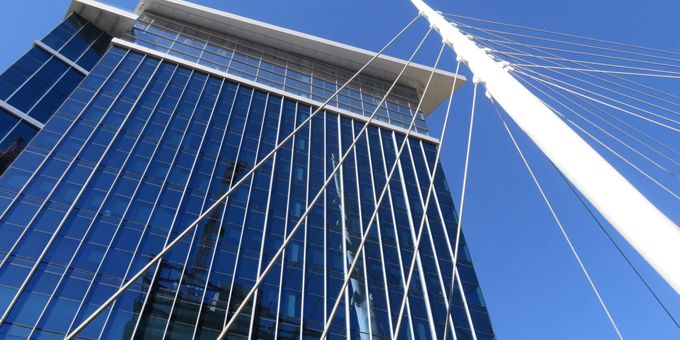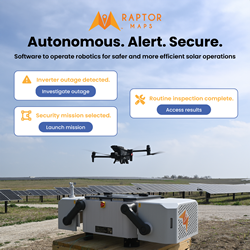Despite the uncertainty surrounding S2289, there's no need for eco-savvy business owners to shy away from investing in clean energy. Renewable power offers numerous benefits at the corporate level, and you'll find that sustainability is good for business.
 Commercial Real Estate and Clean Power Investment Tips
Commercial Real Estate and Clean Power Investment Tips

Adrian Johansen
In 2007, the U.S. solar energy grid produced a negligible 8,775 megawatts, which equaled less than one-tenth of 1% of national energy consumption. The following year, Congress passed a bill allowing for a significant tax credit for home and business owners who installed solar panels or otherwise utilized alternative energy. The bill, the Renewable Energy and Job Creation Tax Act of 2008 (H.R.7060), changed the way business owners and investors viewed renewable energy, and it was by all accounts a resounding success.
Over the past decade, in fact, the average price of a solar panel has dropped by 60%, according to Solar Magazine. And businesses are an industry staple, producing 40% of all renewable energy nationwide.
But that may all change in the near future. The industry-changing tax subsidy is set to gradually fade into oblivion over the next three years, to be phased out in 2022. However, the solar industry, as well as a number of state lawmakers, are championing for the tax subsidy to continue into the future. Introduced in July, S2289, or the Renewable Energy Extension Act, is sponsored by 18 democratic senators, including two prospective presidential nominees: Sen. Cory A. Booker and Sen. Kamala Harris.
The Renewable Energy Extension Act would extend the Investment Tax Credit (ITC) for a further five years, and nearly 1,000 companies have declared their support of the bill. Yet, as of November 2019, its fate remains in limbo. Despite the uncertainty surrounding S2289, there's no need for eco-savvy business owners to shy away from investing in clean energy. Renewable power offers numerous benefits at the corporate level, and you'll find that sustainability is good for business.
Clean Power May Be Financially Beneficial to Your Company
While reducing your company's carbon footprint is an admirable goal, many companies choose to invest in renewable energy for its monetary benefits. From small business tax credits and deductions to a significant reduction in your company's energy bills, investing in clean power is a smart option. No matter the size of your company or your power needs, solar energy systems typically offer a solid return on investment (ROI).
But there are also numerous factors involved in the installation of a commercial solar system that you need to keep in mind. For starters, you should consider your company's power requirements and account for the possible failure of components. Operation and maintenance costs should also factor into the equation.
Sustainable business practices do more than improve your bottom line when it comes to your energy bills, though — studies actually suggest that consumers prefer businesses that are eco-friendly. A 2018 Forbes survey, for example, found that 88% of U.K. and U.S. consumers prefer to support brands that help them live a more sustainable and ethical lifestyle. By investing in clean power, your business can attract those eco-conscious customers.
Sustainability Equates a Safer Work Environment
Installing a renewable energy system at your company headquarters or storefront is a multifaceted job, and older buildings in particular may require a little extra TLC prior to solar panel installation. With classic or historical buildings specifically, you'll want to take particular care to ensure that the building is safe and properly prepped for sustainable retrofitting.
A number of construction components that were prolific in the past are now known to be hazardous, for example. And those materials should be completely removed prior to starting solar energy system installation project. One of the most ubiquitous of those materials is asbestos.
Asbestos is a fibrous silicate material that was widely used in drywall material and as a form of insulation in U.S. construction projects into the 1970s. If your building was constructed between 1930 and 1980, it should be inspected for the presence of asbestos. As asbestos can cause health problems and lead to serious conditions such as mesothelioma, asbestos inspection is crucial even if you have no clean energy plans in place.
Avoid a Solo Investment Endeavor
Even though the possibility of a 30% tax credit remains in place for now, partnering with one or several investors may be in your best interest. An investment partnership may help you offset the costs associated with installation, and see a quicker ROI. Further, business owners who are already involved in an investment relationship should also consider advocating for clean energy at your shared property.
For instance, if you are part of a real estate investment trust (REIT), joining the solar energy revolution makes sense financially. Here's why. According to Fiscal Tiger, “... REIT properties include apartment complexes, hospitals, warehouses, hotels, shopping malls, and office buildings.” By making a renewable energy system part of your REIT business plan, you're likely to attract more tenants who are willing to pay top dollar for sustainable living.
In the U.S., a typical office building owner may shell out more than $30,000 in energy costs annually. That fact alone should make clean energy an enticing option, but the benefits of renewable power don't stop there. You may also be able to attract more customers and create a safer workplace in the process.
* Image Source: https://unsplash.com/photos/M5T4ANO0fB4
If you like this article you may like "How Machine Learning Could Impact the Future of Renewable Energy"
The content & opinions in this article are the author’s and do not necessarily represent the views of AltEnergyMag
Comments (0)
This post does not have any comments. Be the first to leave a comment below.
Featured Product

